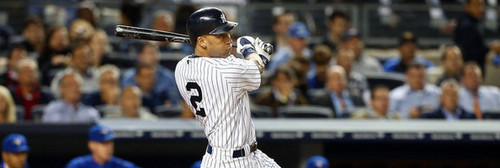A very expensive random number generator
 Recently, Derek Jeter played in the
game in which he has had two or more hits. If hits are randomly distributed, how many multi-hit games would we expect him to have by this point in his career?
Recently, Derek Jeter played in the
game in which he has had two or more hits. If hits are randomly distributed, how many multi-hit games would we expect him to have by this point in his career?
Assumptions and details
- He has played in 2,681 career games.
- He has 4 at bats in each game he plays.
- His batting average is 0.311 (number of hits divided by number of at bats).
- You may want to read Baseball rules if you are not familiar with it.
The answer is 985.935.
This section requires Javascript.
You are seeing this because something didn't load right. We suggest you, (a) try
refreshing the page, (b) enabling javascript if it is disabled on your browser and,
finally, (c)
loading the
non-javascript version of this page
. We're sorry about the hassle.
Let p = 0 . 3 1 1 . The probability of an 0-for-4 game is ( 1 − p ) 4 . The probability of a 1-for-4 game is 4 p ( 1 − p ) 3 . So he should have 2 6 8 1 ( 1 − ( 1 − p ) 4 − 4 p ( 1 − p ) 3 ) = 9 8 5 . 9 3 multihit games.